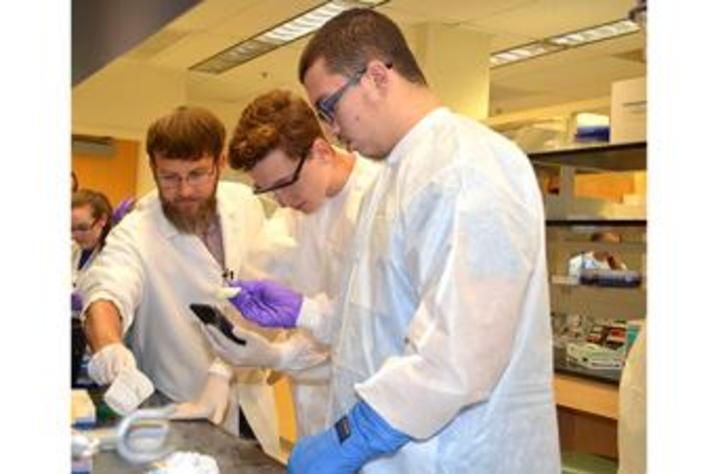UK Instructor Shows Students the Face of Science

LEXINGTON, Ky. (Dec. 20, 2016) – As he energetically bounds across the lab checking on high school students while they extract DNA from tall fescue, there’s no question that University of Kentucky instructor Lou Hirsch is passionate about science and teaching. It is with his passion and enthusiasm that Hirsch hopes to show students the human-side of science and make it something that is very real to them and perhaps a potential career.
“Every one of these students is naturally curious about the world around them, and I think it’s often difficult to apply what real scientists do every day to the high school classroom,” said Hirsch, a lecturer in the UK College of Agriculture, Food and Environment. “An opportunity like this may allow some students who are on the fence about where they want to go with their lives to appreciate what science is really about and to learn how science is conducted.”
In his position, Hirsch provides educational outreach for the Department of Plant Pathology.
The tall fescue experiment he and the students were working on at a UK lab is part of a unique project between college researchers and Garrard County High School. A research team comprising Chris Schardl, department chair of plant pathology; Rebecca McCulley, grassland agroecologist in plant and soil sciences; and entomologist Jen White is working with the high school students to study how the fungal endophyte found in tall fescue affects insect populations. The research is in process at the Garrard County High School farm, and the high school students will collect grass samples from the farm to send to the university for analysis. The students will also take insect population counts at the farm plots.
Hirsch has talked to the Garrard County High School students in the Principles of Biomedical Sciences and AP Environmental Science classes about science in general and the specifics of the experiment at the high school. In the lab at UK, he led students through the scientific process UK researchers will use to analyze the grass samples they will send to them.
“If you don’t have the money or the equipment, it’s really hard to do a lot of the advanced science that’s happening right now,” said Morgan Brogli, biology and biomedical sciences teacher at Garrard County High School. “It’s wonderful that students have the opportunity to come here and see and use lab equipment like liquid nitrogen and a vortex that we don’t have at school. My hope is more of my students have this knowledge and these techniques under their belt before they get to college.”
Brogli said all of the students in these classes are college bound and most plan to major in some sort of science-related field. Garrard County seniors Mary Katherine Oberman and Rebecca Campbell see this opportunity as a glimpse into their collegiate life and perhaps beyond.
“I’m considering majoring in the sciences or something related to that, so I’m going to be spending a lot of time in environments such as this,” Oberman said. “It’s really great to have this experience and start to get comfortable in this setting.”
“I’m interested in the health field aspect,” said Campbell. “I’m not really much of a people person, so I think the lab fits me really well.”
Hirsch hopes opportunities like this will help mold the next generation of Kentucky scientists.
“I think these sorts of ‘getting your boots on the ground, rolling up your sleeves and doing lab work’ experiences are the best way to attract young people to science,” he said. “It’s important that we cast a wide net to get as many interested young people into the field as we can.”




